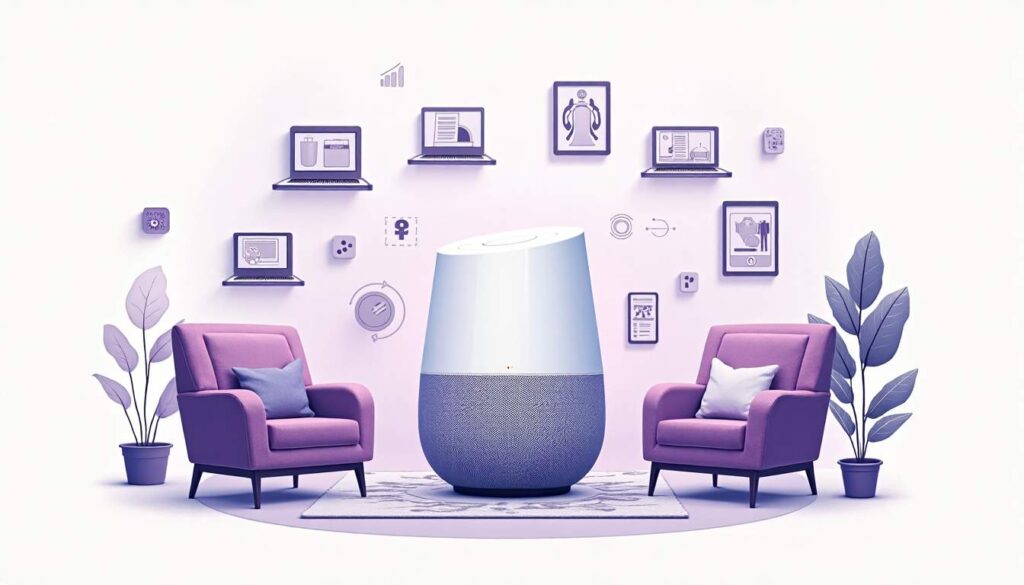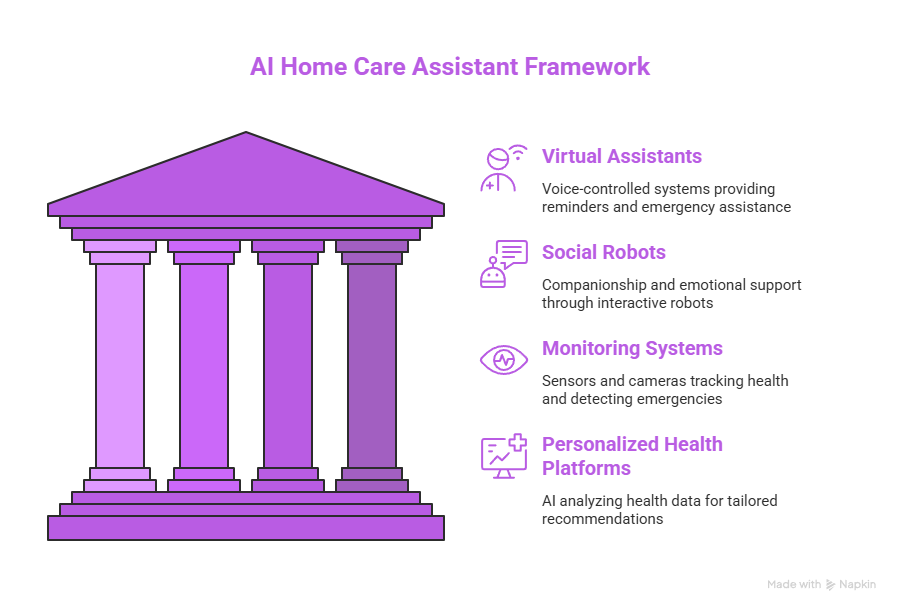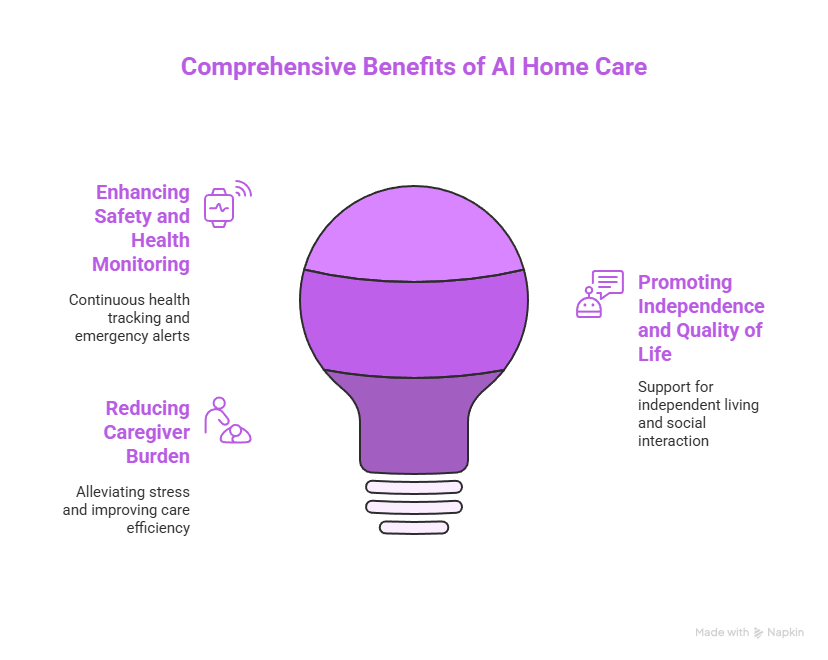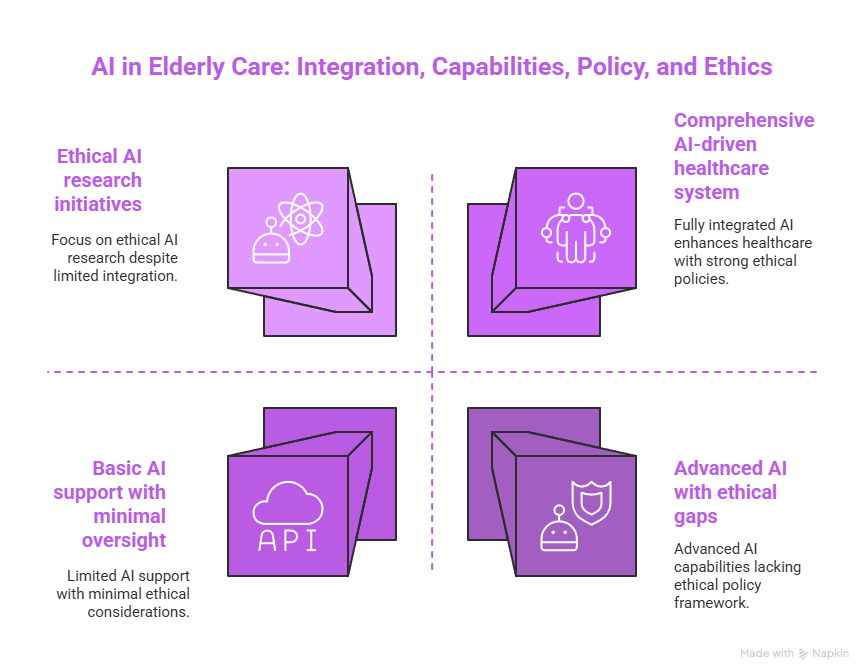Revolutionizing Elderly Care: The Rise of AI Home Care Assistants
06 Aug 2025 By: Vlade Legaspi
Updated

As the global population ages fast, the need for better elderly care grows. Over 1 billion people are now 60 or older. That number may double by 2050. Old caregiving models struggle to keep up. AI Home Care Assistant tools now offer a new way to support aging at home. These smart systems aim to improve senior life and ease pressure on families and health staff.
This article looks at the rise of the AI Home Care Assistant. It covers what they can do, the pros, the hurdles, and what’s next. From real use cases to ethics, see how AI reshapes aging and care.
The Growing Need for Innovative Elderly Care Solutions
Demographic Shifts and Caregiver Shortages
The world faces a major shift as more people grow old. The UN says by 2050, 2.1 billion people will be 60 or older, up from 1 billion in 2020. This fast growth puts heavy strain on healthcare, social services, and families.
A key issue is the lack of trained caregivers. In the U.S., home health aide jobs will grow 33% from 2020 to 2030. Still, demand will rise faster. Families often can’t find care they can trust or afford. Caregivers burn out from long hours and stress. An AI Home Care Assistant could help fill these gaps and ease the load.
The Limitations of Traditional Home Care
Traditional home care services require physical visits which prove expensive and do not exist throughout all regions. The standard visits provide only fundamental care services. The system fails to provide adequate protection and social backing and personal care services. Many seniors who wish to remain at home experience social isolation while their health risks increase and they receive insufficient care.
An AI Home Care Assistant gives a better option. The system provides continuous support through personalized care services while detecting health alterations at their initial stages. The tools reduce caregiver responsibilities and enable elderly people to maintain their independence. Smart devices monitor daily routines while sending alerts to family members or staff about unusual activities which enables early problem detection. Video calls together with games and chat tools enable seniors to stay connected and experience improved mood.
Telehealth implementation in elderly care transforms the process through which seniors interact with medical professionals. The technology enables seniors to consult with healthcare specialists through their home environment. The system reduces the necessity for traveling while simultaneously decreasing the chances of getting sick. The system simplifies medical checkups and enables older adults to maintain control over their health management. The growth of technology including the AI Home Care Assistant will establish an improved system that provides better care for home-based aging.
What Are AI Home Care Assistants?

Defining AI in Elderly Care
An AI Home Care Assistant uses smart tech to help seniors with daily tasks. It blends machine learning, voice tech, sensors, and computer vision to give support.
These tools go beyond basic devices. They learn from users and adjust over time. They remind users to take medicine, spot emergencies, give company, and track health.
Many work with smart home tools to make care smooth and simple. This helps seniors stay more independent and live better while still getting the help they need.
Types of AI Home Care Assistants
There are several categories of AI home care assistants currently in use or development:
- Virtual Assistants: Voice-controlled systems like Amazon Alexa or Google Assistant enhanced with healthcare-specific skills to assist with reminders, emergency calls, and information retrieval.
- Social Robots: Robots such as ElliQ or PARO designed to provide companionship, cognitive stimulation, and emotional support through interactive conversations and activities.
- Monitoring Systems: AI-powered sensors and cameras that track movement, detect falls, and monitor vital signs, alerting caregivers or medical professionals when anomalies occur.
- Personalized Health Platforms: AI applications that analyze health data to offer tailored recommendations, manage chronic conditions, and coordinate with healthcare providers.
The AI Home Care Assistant keeps evolving fast, with new features that boost care and user comfort. Some can now read tone and face cues to match the user’s mood.
This helps ease loneliness and lifts emotional health. New tools also let the assistant link with telehealth services for online doctor visits from home.
Another big step is using AI to study data from wearables and health records. This lets the AI Home Care Assistant spot risks early and help stop problems before they grow.
These smart systems do more than help in the moment, they guide long-term care and improve health over time for seniors and their families.
Key Benefits of AI Home Care Assistants

Enhancing Safety and Health Monitoring
A key benefit of an AI Home Care Assistant is its nonstop tracking of seniors’ health and safety. Fall alerts can reach help fast, cutting response time and boosting outcomes.
These tools also track heart rate, blood pressure, and sleep. They spot early signs of trouble, helping avoid hospital visits and better manage long-term illness.
Beyond body health, the AI Home Care Assistant checks behavior too. It sees signs of stress or mood shifts, giving a fuller view of a senior’s well-being.
Promoting Independence and Quality of Life
An AI Home Care Assistant helps seniors stay independent. It manages meds, schedules, and chores using smart home tech to delay the need for full-time care.
Social robots and virtual pals also fight loneliness. They chat, play games, and boost mental skills, helping lift mood and cut signs of depression.
These tools adjust to each person’s likes and needs. This keeps talks fun and personal, building a bond that supports emotional health.
Reducing Caregiver Burden
Family caregivers experience high levels of stress and burnout. The AI Home Care Assistant reduces daily care responsibilities which enables families to concentrate on emotional support.
The implementation of AI tools enables faster completion of tasks including note-taking and scheduling and updating. The system enhances the quality of care delivery while reducing the time required for tasks. The system enables teams to collaborate more effectively.
An AI Home Care Assistant generates a complete health overview of seniors through its ability to collect data from multiple sources. The system enables caregivers to create better plans while addressing each individual requirement.
Real-World Examples and Success Stories
ElliQ: A Social Robot Companion
ElliQ is an AI Home Care Assistant built for seniors living alone. It chats, gives reminders, suggests fun tasks, and helps with video calls to family. Studies show ElliQ reduces loneliness and boosts activity. Its friendly style makes users feel less alone, which helps mental health. ElliQ also learns what users like. It adjusts chats and tips to fit each person’s habits, making care more personal and useful.
CarePredict: AI-Driven Health Monitoring
CarePredict uses a wearable and AI to track daily habits. It spots early signs of health problems by noting changes in movement or eating. The system alerts caregivers fast, helping avoid hospital visits. It’s used in many care homes with strong results. CarePredict gives seniors freedom while staying safe. The data also helps doctors create better, tailored care plans.
Amazon Alexa and Healthcare Skills
Amazon Alexa now offers health “skills” that help seniors with meds, appointments, and reaching emergency contacts fast. It links with telehealth tools so users can meet doctors from home. This boosts access to care and saves time.
Alexa also shares health info, leads simple workouts, and plays music or books. These features keep seniors active and entertained. Its voice control makes it easy for those who don’t use tech much. As Alexa updates, it stays useful for seniors wanting to stay well and independent.
Challenges and Ethical Considerations
Privacy and Data Security
AI home care assistants gather sensitive personal and health data which creates privacy and data protection issues. Organizations need to establish strong cybersecurity systems and clear data policies to build trust while following HIPAA standards in the United States and GDPR standards in Europe. The threat of data breaches creates a major security risk because unauthorized health information access enables identity theft and other harmful activities. Organizations need to implement advanced encryption technologies while performing regular risk assessments and audits to detect system vulnerabilities. User education about data privacy rights along with protective measures will increase their trust in these technologies.
Technology Acceptance and Usability
The adoption of an AI Home Care Assistant depends on ease of use. Many seniors struggle with tech, physical limits, or doubt about new tools. Simple designs, hands-on training, and user input can boost trust and comfort. It’s key to tailor features to match different needs and skills. Seniors have varied levels of mobility and memory. Tools must fit each group, like those with poor vision or movement issues. Training family and caregivers too builds support. This helps seniors feel safe and more open to using AI in daily care.
Maintaining Human Connection
An AI Home Care Assistant can support care but can’t replace the warmth of human touch. Tech must work with people, not push them out.
Human contact lifts mental health and gives comfort that AI lacks. Caregivers also read body language and offer real emotional help.
To keep care personal, AI should boost, not replace, human roles. Seniors need both smart tools and real human bonds.
Blending tech with people builds stronger care. It keeps seniors safe, connected, and valued in a world that’s growing more digital.
The Future of AI in Elderly Care

Integration with Healthcare Systems
Future AI home care assistants will integrate fully into electronic health records and healthcare providers’ systems to enable both data sharing and coordinated care. Such integration enables healthcare providers to deliver patient-specific treatment plans and continuous health monitoring that enhances treatment results. The data analysis capabilities of these systems allow them to identify upcoming health problems so caregivers can provide preventive intervention. The AI assistant detects irregularities in patient activity patterns and vital signs which triggers instant alerts to healthcare professionals for immediate medical response.
Advancements in Robotics and AI Capabilities
The current research focuses on improving AI assistants through advanced natural language understanding capabilities and emotional intelligence alongside enhanced physical capabilities such as mobility and dexterity. These developments will lead to advanced support services that range from assisting physical therapy to executing household responsibilities. A robotic assistant will perform daily exercises with seniors while conversing to provide companionship and fight off social isolation. Machine learning algorithms integrated into robots will enable them to learn individual preferences and needs which results in better and more customized care delivery.
Policy and Infrastructure Development
The implementation of AI home care technologies requires governments and organizations to establish policies and infrastructure that guarantee safety together with ethical and equitable deployment practices. The deployment of AI home care technologies requires funding for research together with standards for interoperability and programs that support equal access for all socioeconomic groups. The increasing demand for training programs will occur to provide healthcare professionals and caregivers with competencies to work alongside AI technologies. The growing implementation of AI in elderly care demands urgent ethical framework creation to address privacy concerns together with consent challenges and algorithmic bias problems. The development of these technologies needs to focus on inclusivity to establish trust and acceptance among caregivers and elderly users.
Trending Now!
NEC Laboratories Singapore will unveil an early-stage prototype of its AI Elderly Care Assistant at CHI Innovate 2025. Branded “ElderWise,” the assistant aims to support seniors living at home by offering adaptive, voice-based help with daily tasks. It’s built to promote independence while gently learning and responding to each user’s habits and needs.
The AI tool also provides real-time updates to caregivers, helping them spot issues early without taking away the senior’s autonomy. It offers both functional help and casual chats for mental engagement, showing NEC’s goal to create tech that truly fits into daily life and community care.
Conclusion
AI home care assistants have emerged as a revolutionary development which transforms the way elderly care operates. These systems unite technological sophistication with design empathy to create pathways which lead seniors toward safer independent lives with greater fulfillment. The existing challenges do not diminish the substantial advantages that AI home care assistants provide to people and their families and healthcare organizations.
The complete realization of this technological revolution depends on the collective efforts of technologists with healthcare professionals and policymakers and elderly individuals. The future of aging at home represents more than technological advancement because it aims to improve human dignity and connection and enhance quality of life through innovative solutions.
AI Home Care Assistant tools are shaping a new future in senior care. They bring safety, freedom, and comfort to aging at home. Want to see it in action? Sign up for Helpsquad Health today or start your free trial now. Try the future of care—simple, smart, and made for you.


